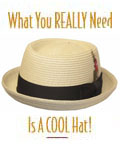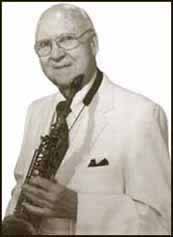
 |
 |
 |
 |
 |

|
|
|
(2003 Interview) Although trained as an alto saxophonist, Bill Zickafoose played tenor sax with the military orchestra that replaced the Glenn Miller band in Europe after that group was ordered home in 1945. The orchestra led by Jack Platt, was assembled to act as a morale booster for the thousands of troops left stranded in  the European Theater at war's end. The band traveled Europe backing acts like Bob Hope, Jack Benny, Francis Langford and Jerry Colona.
the European Theater at war's end. The band traveled Europe backing acts like Bob Hope, Jack Benny, Francis Langford and Jerry Colona.
Today, Bill Zickafoose leads his own band "The Continentals" which has been together for over 35 years. In this interview, Bill talks about performing in Europe, his theory on Miller's disappearance and his time playing with jazz guitar legend Django Reindhardt.
{Craig} The band you played in took up the schedule of the disbanded Miller Orchestra. How did that come about?
{Bill} We had a dance band inside the (about) 35 piece military band. Most military groups did. The guys were a mixture from all over (the country). I don't know how they were selected ... I guess they were selected by their ability. We stayed in England until the war was over. We would travel all around England to the hospitals and air bases. There were air bases everywhere you looked ... just about. We did concerts in air hangers, NCO clubs, officers clubs and Red Cross clubs. We didn't stay anywhere more than five or six days. We played in England Scotland and Wales.![]()
After VE Day they shipped us to Paris where we set up our headquarters at Orley Field. We came across the Channel of Paris to southern France. When we got down there, we got to see some of the effects of what the Germans had done. Ships in the harbor and all that sort of stuff. Boats upside down. I got a glimpse of the destruction as we flew over from England into Paris. All that stuff was still laying around. The war had only been over for a short time so they hadn't cleaned up anything yet. All these ships were sunk in the harbor there in Normandy ... tanks and trucks. We just flew over... I didn't get out of the plane or anything ... but it was still there!
I think Glenn Miller had a head-on collision with another plane going the opposite way. We had a scare like that ... I heard a plane go by ... it sounded like a truck, a truck when it passes close to you on the highway going in the opposite direction. That WHISSHH sound of air? That's what it sounded like.
There was fog everywhere and it rained all the time. Foggy, rainy and cold. A biting cold from the moisture and the wind too. You had to be there to really get the feel of it, because it's a wet cold, rather than a frostbite type thing. This was during the Battle of the Bulge and planes were flying everywhere...in all directions.
{Craig} Was the Miller Band a large band at the time?
{Bill} They probably were in Europe. Have you ever heard of Ted Heath? Ted Heath was starting out and more or less copying the Miller style...a clarinet lead with five saxes and that sort of thing. They had a great band. But the Glenn Miller band in Europe wasn't like the band in the states. It was a huge orchestra. They had strings. It was a big orchestra.
{Craig} Did you feel they were the most popular band at that time?
{Bill} Oh yeah. They were probably as popular as any big band in the world when [Miller] went into the service. He wasn't drafted by the way, he volunteered. He wanted to donate some time to the country I guess he felt obligated to give back. He gave ... maybe ... a little too much.
We were sent to Europe to entertain the boys who were left there ... maybe hundreds of thousands. These guys were all stranded. The war was over and they were sitting around, getting into fights, killing themselves on the highway, wrecking themselves and they were having a real problem with what was going on there. These guys were very impatient to get home because they'd been there awhile, fought the war and they wanted to go home immediately. Well you can't get them home immediately because these big ships only hold a couple thousand people and it takes as long to get them back as to get them over there.
After the war, Ray McKinley formed a band he called the Glenn Miller Band led by Ray McKinley and this put him in competition with Tex Beneke's version of the Miller band.
{Craig} I didn't realize they were in competition with each other.
{Bill} Well...more or less.
I ran into Tex Beneke one time when he played in Richmond and I was kidding him about his old Martin saxophone. He played a Martin tenor saxophone with a terrible horn! He said ... well ... when you've got a winner, you stay with it (laughs). I played a Martin tenor and I couldn't stand it! The thing played real sharp in a high register and flat in a low register.
{Craig} How about Glenn Miller's reputation of not being easy to work with?
{Bill} He was a disciplinarian. They didn't like to work for Tommy Dorsey either. Let's put it this way ... they wanted to work with a guy that paid the money didn't they?
{Craig} I once heard a story that when the Miller plane went down...the band threw a party.
{Bill} Oh I don't believe that! That's a lot of balony there.
Glenn Miller was a straight guy. He wasn't a great jazz trombone player. You know that, right? He got by and that's about all but he was a great organizer. He played well enough and he did a damn good job! He had some musicians that weren't great musicians but they got a great sound.
{Craig} Did you play with Django Reindhardt?
{Bill} Oh yeah. I knew Django well. He called us "Django Reindhardt and his American Swing Band." Hey you can buy this stuff!
He had tremendous one-string ability which at that stage of the game, was like a forerunner. There wasn't many guys around who could execute like he could and you know his left hand had been burned in a fire. I have no idea how he could move around like that but he did but he was a hell of a player.
{Craig} He was a great player. Did everybody know at the time that he would be such a legend?
{Bill} I didn't know it. I thought he was a great guitar player. At the time I was just a kid with no respect for anybody. You know how that goes. He couldn't speak any English. We had to have an interpreter to communicate with him.
When Django came to the United States he played with the Duke Ellington band.
{Craig} I didn't know that.
{Bill} It wasn't a very succesful tour...but he did.
{Craig} Do you have a favorite band?
{Bill} Ted Heath is my favorite band. I liked all the big bands really.The Dorsey Brothers were very good. Benny Goodman was always my favorite clarinet player. Artie Shaw had a good band too but he wasn't the clarinet player that Benny Goodman was.
{Craig} I often hear Artie Shaw was a better player.
{Bill} Hell no! [Goodman] was a concert musician. He had a better sound than Shaw. Goodman played in ALL keys very well.
Buddy DeFranco was a great clarinetist. He had a ton of technique but tone is the most important thing. You can learn to read but if you can't get that sound...
{Craig} Have you got a favorite male singer?
{Bill} I like Steve Lawrence.
{Craig} And female?
{Bill} Rosemary Clooney.
{Craig} You're lucky! Your favorite singers are still performing.
{Bill} Yeah. Billy Eckstein was a damn good singer. Johnny Hartman was good too! There's a lot of great singers you've never heard of...because they don't get the breaks.
{Craig} What do you think brought about the decline of the big bands?
{Bill} Economics... The Dorsey's fell ill...Sorry, I've got to go now Craig.
{Craig} O.K. Bill, thanks.
 Dean Martin & Jerry Lewis sandwiched 16 money making films in between nightclub engagements, recording sessions, radio shows and television bookings during their 10 year partnership.
Dean Martin & Jerry Lewis sandwiched 16 money making films in between nightclub engagements, recording sessions, radio shows and television bookings during their 10 year partnership.